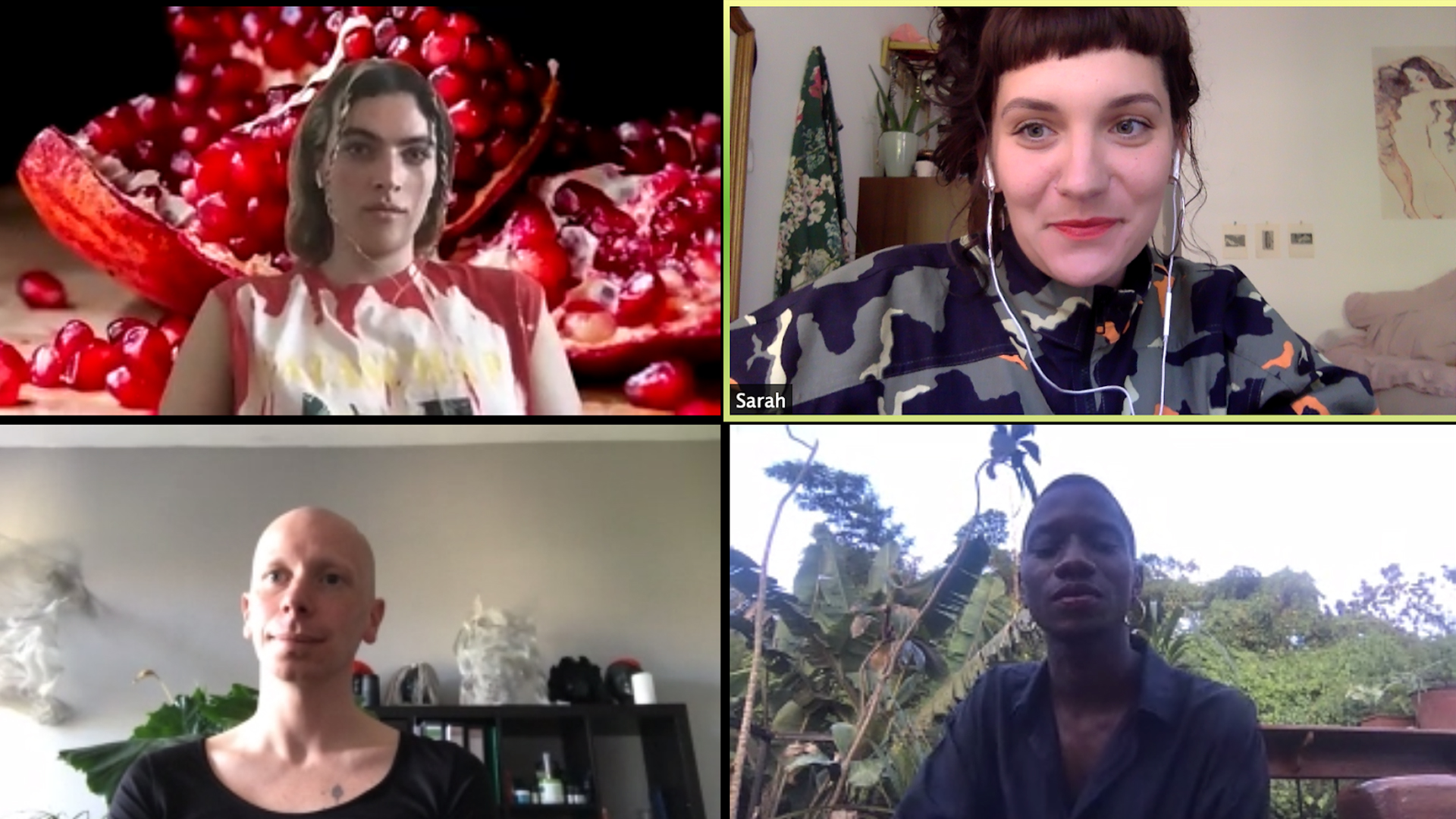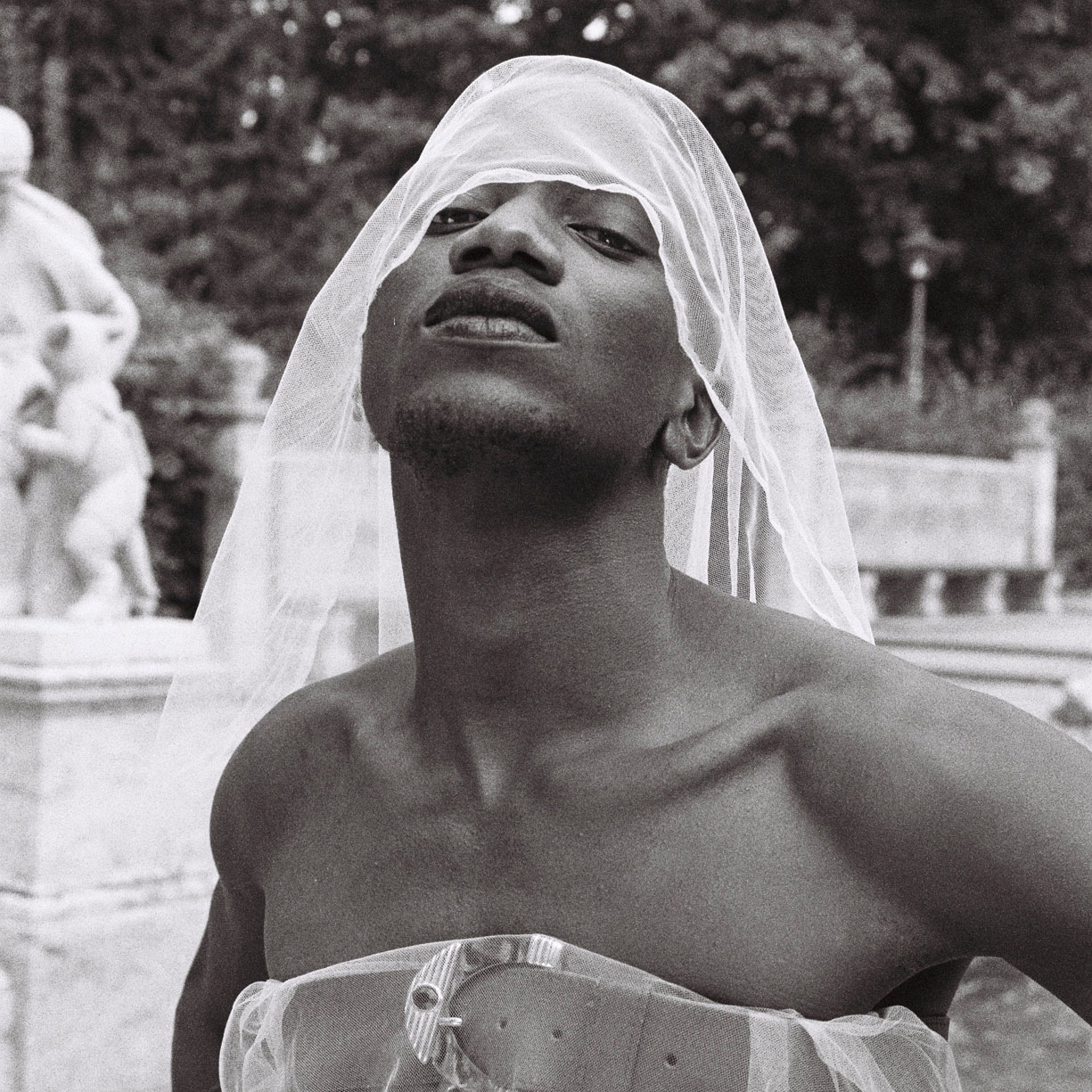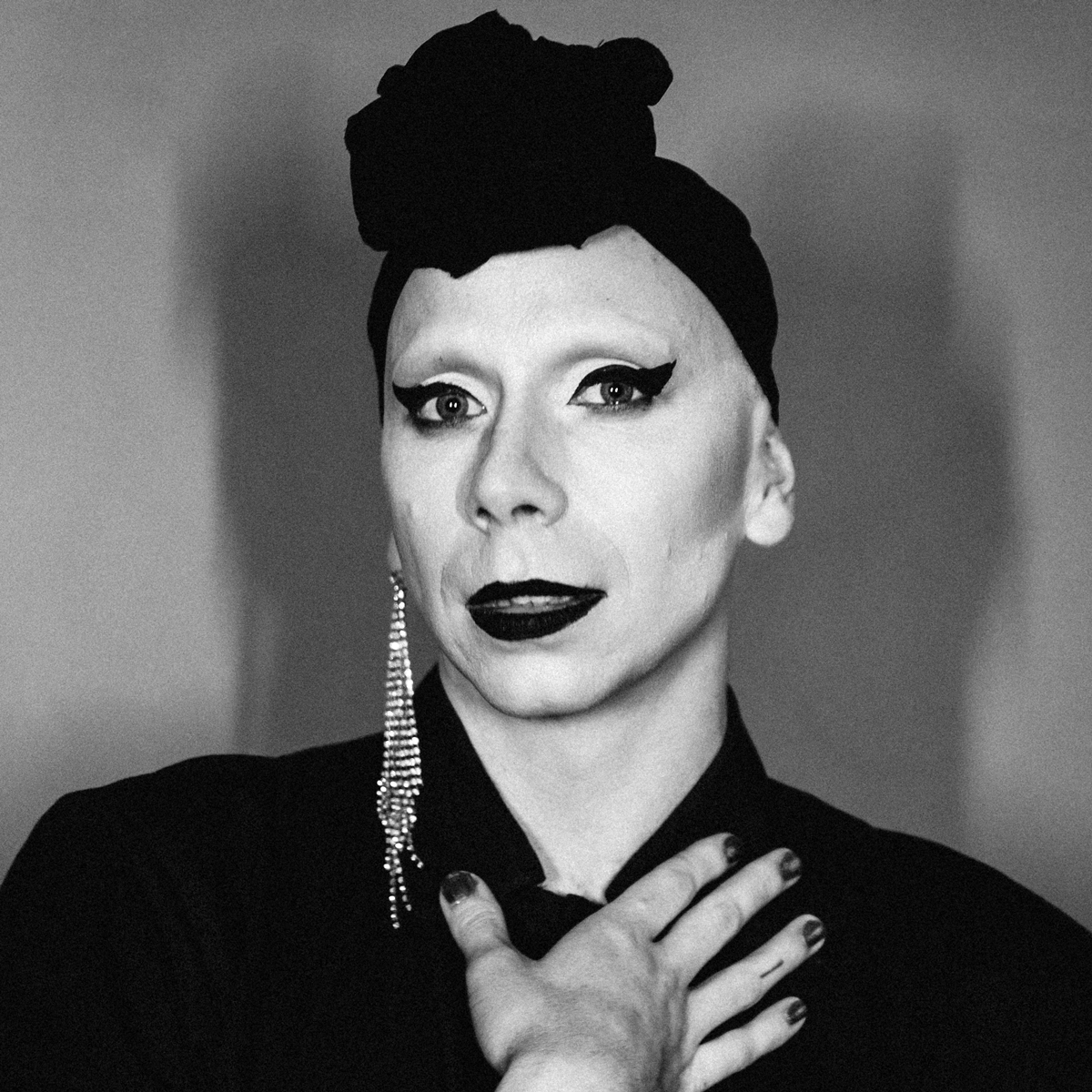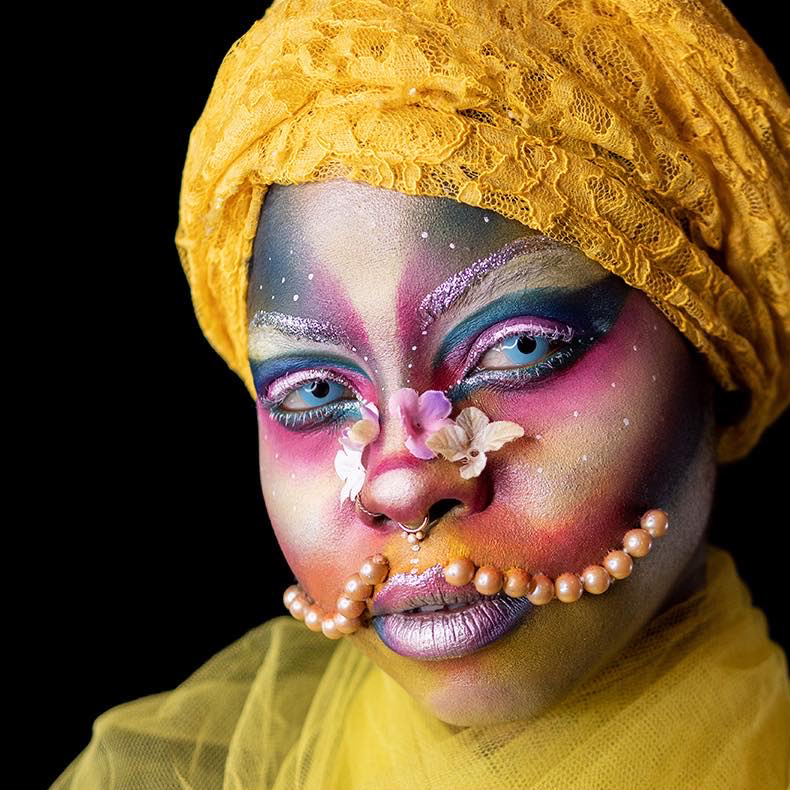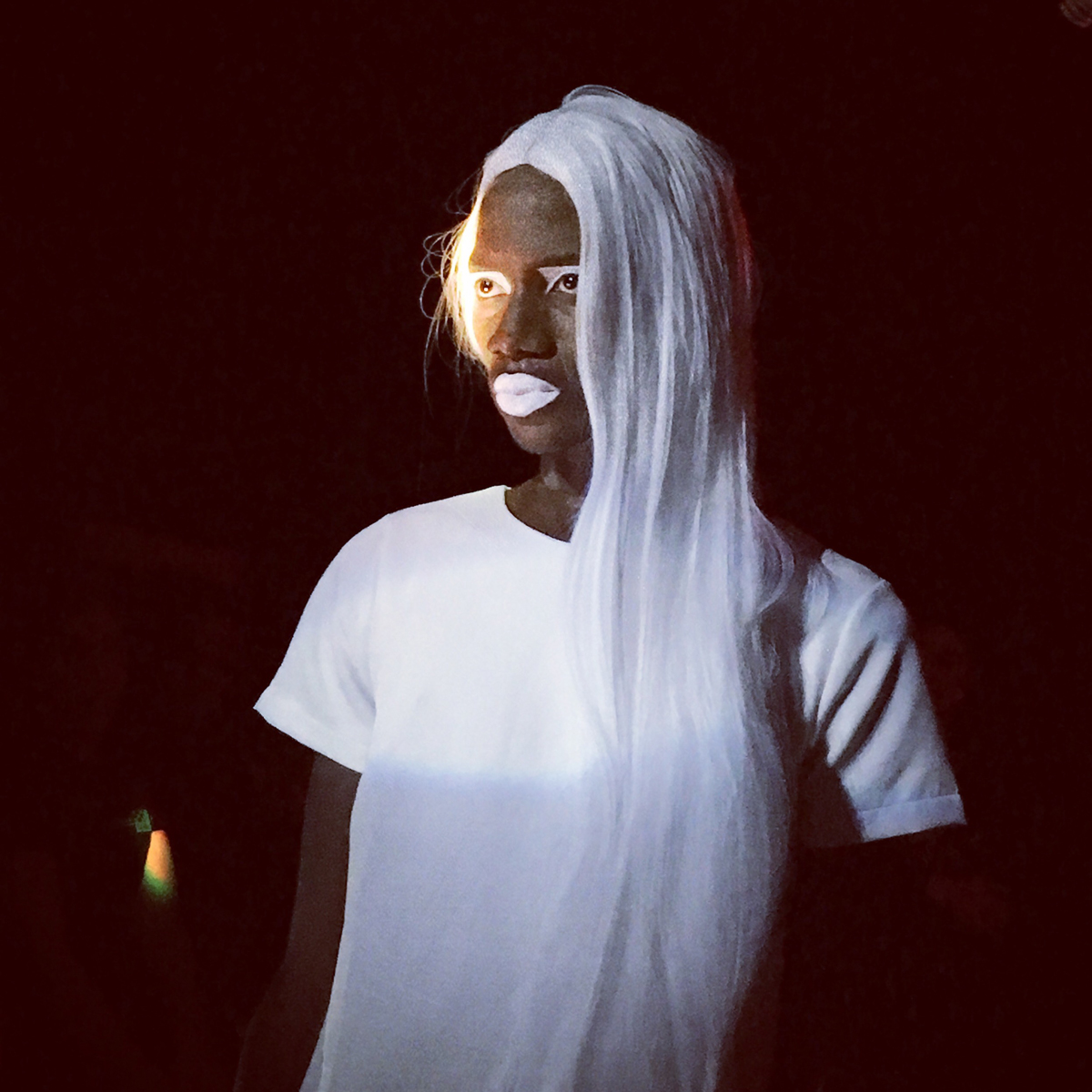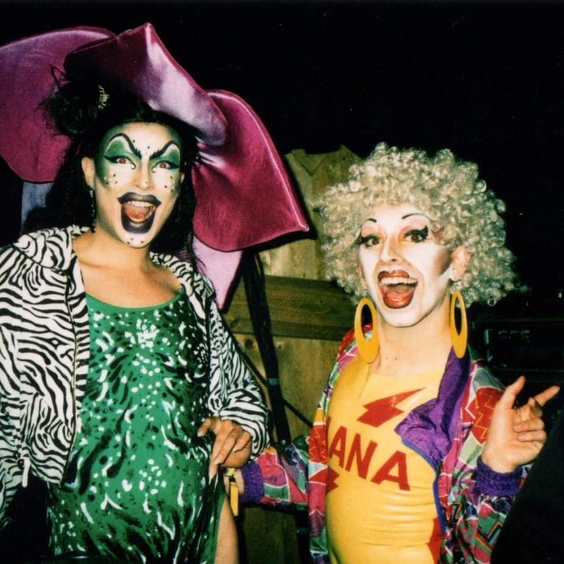NOTE: Unfortunately, Adrian Marie Blount was not able to participate in the video discussion we had. Their answers were edited in afterwards.
Sarah: Hey, thank you all for being here
at our virtual discussion.
Would you like to introduce yourselves?
Tayo: My name is Tayo. I live in Kampala, Uganda and perform using the name Authentically Plastic. It started initially as Drag performance, which it still is in a way, but now it has continued into music, sound production and DJing.
Olympia Bukkakis: I’m Olympia, I’m a drag performer from Australia and lived in Berlin for 8 years. I work mostly by doing Drag, even if sometimes it doesn’t necessarily look like Drag, I barely ever wear a wig. I am really interested in Drag outside it’s context, doing weird drag in weird places or doing Drag in places where it doesn’t normally happen.
Adrian Blount: My name is Adrian Marie Blount. I am 30 years old from San Diego, California. I identify as a black non binary- trans femme being. I am expecting a child.
Parisa Madani: My drag alter Ego is Psoriasis, I grew up in Germany most of my live, but also in Iran and the US. I have been in Berlin for a long time and now I am studying dance and choreography in Amsterdam, trying to find new ways taking Drag from the club and the entertainment sector to all kinds of different places and transforming the idea of what Drag can be and what Drag needs to look like. I am also making a lot of music right now, at the moment I am writing and producing a german rap album, but also kind of going into storytelling with inspirations from Laurie Anderson to create simplistic ambient tones and narrating a story for people to see it either as a dream sequence or some kind of guided adventure.
Parisa: Right now I am writing a song that is called “Wreck my hole tonight.” It’s about spending nights alone with yourselves, with your holes, your anus, your toys and really deciding for yourself how much you want to wreck your own hole tonight because there is no one else around to do that. I find it really wonderful to fall in love with your own hole and your toys while surpassing, pushing and respecting your limits.
Sarah: How much does the exploration
of yourself and self-empowerment
influence your drag practice?
Olympia: I didn’t start performing because I wanted to find myself, I just did it because I wanted to. I’ve always identified as genderqueer or something, but definitely never as a man. By the time I was interested in articulating a trans identity more seriously or by the time I felt like I could, I used the tools that I had from Drag. I haven’t had any surgery that make my body visibly altered, I don’t take hormones, therefore a lot of the ways I articulate my gender identity through are movement and clothes and stuff that would more traditionally be related to Drag. I didn’t start doing Drag as a way to express myself but when I wanted to express myself in a particular way and differentiate myself from what I know people identify me with because of my voice and my appearance – a lot of people see me as a man – Drag had a set of tools that I could use.
Adrian: When I first was approached with the idea to explore drag, I was hesitant because I felt that it was an art form that was made for cis men to explore gender. Of course that was a very uninformed point of view clearly symptomatic of our patriarchal society. As I pondered more about exploring the craft I thought of artists such as Josephine Baker, Ma Rainy, Gladys Bentley amongst other black legends who used drag as a way to explore gender. Furthermore, i thought- how misogynistic to tell any femme person that they aren’t allowed to explore their femininity in whatever capacity they choose. So by choosing to explore Drag, I was reclaiming my agency over my femininity and how I interpreted it for myself and those gazing upon me, and was able to then further explore my non binary identity through this type of performance art.
Tayo: For me Drag is less a tool of self-expression and more something that I use to forget myself, to depersonalize and to see the possibilities in becoming other than what I am. I started doing Drag when I was living in San Francisco and for me it was really exciting to test out artistic ideas within a club space because it has none of the pretention that comes with galleries or other art spaces. In a club space, there is a nice opportunity to do some experimental things. For me the thrill of Drag has always been in becoming other than what I am. Taking on some other type of persona, seeing what that persona creates. Drag as a tool of depersonalizing oneself – that also enables you to take a lot of risks.
Parisa: I can relate to the idea of finding personas or characters that are kind of distant to your own because that way you can experiment a lot. I also use it like tools, this Drag character, the application of material, make-up, clothes, body-altering, dehumanizing shapes on the body, transforming this body to anything that is not human. That was one of the first things I realized that I want to do in Drag. In my very early stages of Drag I also came to the sensation of being trans and that I want to transform further. I use Drag to transform into anything that doesn’t have to be human, that doesn’t have to be beautiful or natural or easy to digest or understandable or anything like that. I had such a huge desire to break out of this human shell and to create something non-human, so I started creating Drag personas and excuses for me to be really loud and aggressive and demanding and not pleasing and not comfortable for the eye or the ear of the audience. That was always like a safe haven for me or a goal to achieve. Once I’m in Drag I can be loud and aggressive and people will take me seriously somehow. People will look at me, recognize me and they will somehow categorize me as a Drag queen or Drag monster. Having this outside shell of a terrorist clown helps a lot to gain some attention and superficial respect – in the club scene at least. I can use this Drag character to tell my stories, because I need to tell them and obviously people listen more when I spit blood or wear big pink hair and really deforming kind of material on my bones and flash or mix it to some Rihanna song. I see it as a portal that I can activate and shoot information through. That helps a lot.
Sarah: You already started describing your Drag personas – can you tell a little bit more about your characters?
What are they, who are they, how do they look?
Parisa: I find it hard to narrow one character to a certain style.
Olympia: Yeah, Psoriasis always looks so different – by the way, what pronoun does Psoriasis use?
Parisa: I think she is okay without pronouns.
All laugh.
Parisa: “She” is fine.
Olympia: Okay, when I try and think about what Psoriasis looks like it’s so many different things …
Parisa: … doesn’t work. I really have a lot of different faces and bodys that grow in different seasons. Usually it’s loud, the colours and the shapes tend to be loud and unpleasing.
Tayo: I try to switch it up everytime, but one common thing that goes into my Tayo persona is a kind of severe vision of femininity. It’s funny, because I also really am performing all kinds of femininities that I have observed in my life and kind of admire. There is not so much bright colours or anything, I try to see what I can do with less, although I also appreciate the kind of maximalist approach to Drag appearance. But I like to play more in a space where I am serving something severe but with less. I do very hush eyeliner, or will just throw on a white dress or something very minimal.
Olympia: I like the idea of Drag minimalism. I think I do that, too. I hated doing make-up when I started, I found it very difficult. That was however how it started, but how it evolved for me was this minimalist sort of thing. I like to do very small things in a way that have a big effect. I went through a face of barely wearing any makeup at all, this was while I was studying dance, because I was really interested in what you can understand through Drag when you strip away the more recognisable parts of it. I had this competition with myself to see how far I could go before I was not even doing Drag anymore. So I’ve done performances where I was not wearing any make-up or I wasn’t lip syncing or whatever. I’ve been really interested in pushing that. But then I also go back the other way where I become really interested in a more over the top or feminine Drag form. My general aesthetic is really minimal and almost like religious looking stuff, because Drag is so ritualistic. What’s interesting about it as a performance form is that it relies more than other forms on the participation of the audience, which means it’s more a ritual. When you go to a church, the priest is doing something important but it doesn’t work without the audience being actively involved. So I am interested in working with this aesthetic and working with it like a concealment and revelation. I wear a lot of stuff that covers and hides my boy, but I don’t feminize my body at all.
Adrian: My Drag Persona starts with my name. Broken down: God- speaks to the magical negro which is imposed upon black bodies to provide wisdom, insight and knowledge to those who are soul searching, ignorant, or need guidance. XXX-speaks to the sexualization of the black body X- intersectionality: my identity is intersectional as I am a black, non binary, femme. Noir- black Phil- comes from the Greek root word meaning ‘to love.’ thus together Noirphiles speaks to my love of my blackness.
Adrian: GodXXX Noirphiles is from a planet that is much like Wakanda however is billions of light years away and is 10,000 years in the future, She has come to earth to research the plight of the human condition. Their flying vessel crashed into the Atlantic Ocean where He became tangled in plastic! He will never understand why human’s develop innovative ways to harm their environment! She enjoys finding ways to repurpose this wasteful material into fashion. Give Him all your trash, baggage and fragility! GodXXX looks many different ways depending on their mood. They can have razor sharp cheekbones one day, and a neon colored beard the next.
Tayo: I like this whole idea of minimalism in Drag. It also ties for me into kind of a queer minimalism. Everytime people talk about things like queer aesthetics, the assumption is that it has to be something that is maximalist. I think it’s a challenge to find out if there is a queer minimalism and what it might look like. Thinking about safety, I also think about the idea of serving looks as kind of deterrent for any possible violence. This idea of trying to create a look that is really severe and sharp also has to do with sending a message like: Don’t fuck with me, I might curse you.
Olympia: I also don’t do really intense make-up, because I don’t have to money to get cabs to my gigs. This sort of like aetherial, non-binary, weirdo look that I do in and outside of Drag is also partly a away of avoiding violence. My lip isn’t moving at the moment because I am still recovering from a surgery from being bashed. I was not in Drag, but femme-presenting and I was attacked on the street with a friend and had my elbows bruised and my jaw fractured.
Olympia: Part of a Drag performers’ art practice is not getting attacked on the way to work. You think about putting this thing together how you look keeping in mind that someone might attack you on your way to work. I think people don’t talk about that very often, because it is really depressing. But avoiding violence is a really big part of how i put my aesthetic together.
Parisa: I remember one time when Olympia and I were working together and getting ready in the backstage. And I had my sixteen makeup bags with me and my big suitcases and Olympia literally had a tiny pouch with a matte-brown lipstick and that was it. At that moment I was so in awe because I realized how much Olympia is perfecting the art form of Drag by finding one core essential product, a key to the locked door of Drag, which is for me, watching from an anti capitalist and anti-consumerist way of making Drag, that you don’t buy a new crazy outfit all the time, because you somehow narrow it down. I tried that but if I don’t put on any make-up I look like the femme that I am now. About safety: I realized, that when I’m in Drag I get less attacked and less harassed on the street than when I am out of Drag.
Sarah: Why is that?
Is Drag like a protective shell for you?
Parisa: I assume it is since my Drag is not about presenting a feminine human or any human but rather a monster, a clown, a genderless explosion but my outer Drag self. Parisa is quite femme, she likes to have her hair cute and be pretty on the streets. Because people don’t like to see feminine people being cute or happy and thriving the way they are in public, I kind of put that into the context of people hating women, people hating femininity and queer-femininity, so I guess it’s easier to target a strong feminine person.
Tayo: It’s a kind of balancing act, because I want to be safe but at the same time I want to present something that is also threatening to people. When you say you get attacked mostly when you do a crazy Drag, I find that interesting, because for me I would want to present something threatening intentionally. This is the balance between wanting to be safe and wanting to be subversive.
Olympia: It is interesting to hear that you two have the experience of really going for it feeling like it’s protecting you. I used to have a much more of a trash Drag aesthetic, but we all grow up. And I didn’t get harassed by then, so yeah, if I look more femme then yes. But now I actually just want to be invisible when I am in public. I remember wanting to make an intervention in public, but now I’m just afraid. This has been the worst attack that I suffered, so maybe it’s a special period of my life, but I also felt afraid before. I just want to get to work safe. That sounds really sad, but it’s true.
Adrian: I’d rather not talk about this. It’s in the news. If folks are curious they can google. Say their names.
[Link ⤵︎ Interview Tagesspiegel]
Sarah: Tayo, in your artist announcement it says that your sound is “necessarily political.”
Is that a response to those threats?
Tayo: Yes, especially because I am in this awkward position where the thing that puts me at risk is also what protects me. For example last year with my Boiler Room performance at Nyege Nyege festival: The government came really hard on the festival because of that performance. They said it was promoting homosexuality, open sex noises and things like that. I kind of became the symbol that degenerates the festival and it’s interesting that I was a subject of all those conversations but nobody really knew who I was or was able to pursue me. So in a way, really going for it fully, with a wig and everything, it really did protect me in that situation. The only time where I feel like performing without a wig is when I’m performing in Europe, because I feel safe for my face to be open wide. This is the political aspect of it. And musically I think the politics is in a way of not sticking in a specific genre. A friend of mine described it as moving from one regime of sound into the next one, and it’s funny because we are in a place where there is never actually a regime change. Using radical changes in sound is kind of like a politics.
Sarah: Parisa, you are part of the Oeuvre collective, Adrian you co-founded the House of Living Colors collective.
Olympia, you are the host of an event called Queens against borders.
All of your works are really political. What are your intentions?
Adrian: My work is inherently political because I am a black person existing and saying something. My work provides space and doesn’t ask anything at all from white people besides to respect our space and our bodies or leave. Which I think is huge for a black person, especially a non binary trans black person to do. We don’t ask for allyship, and challenge what that word means. Is it just a term people use who consider themselves politically active? Or can this also be applied to friendships and romantic relationships with folks who have been historically marginalized? My work is political because I demand that we be treated equitably and not equally. And that no matter what, no one will be asked to provide free labor.
Olympia: I often had my regular Drag practice labelled as political Drag. And I have mixed feelings about that, because I’m interested in politics – I started performing while I was doing a degree in social theory and gender studies – but I get very uncomfortable when Drag is posited as activism itself, because in the political climate we had in the last decades, a lot of things that aren’t necessarily very effective political strategies are taking place. So people are more willing to understand politics in a Drag show than a strike for example. I’m wary about the idea of people thinking that we can get the same thing from a Drag show that we can from industrial action or something like that. But I am really interested in politics, intellectually but also in terms of using Drag to articulate some ways that I think things just work so we can have a more just society.
Sarah: Like when you did your Masters degree “Tales From a State of Shemergency”
referring to critical theory.
Olympia: Yes, or Queens against Borders would be something like that. I am always ambivalent about that. What people find exciting about this are a lot of the things that can tend to a tokenism, because it’s a party in solidarity with trans and queer refugees. For example our interaction with the media, we always need to be quite careful with that, because the german media loves the story of a trans/queer refugee who suffers homophobia or transphobia from other refugees. This feeds into racist narratives that are very popular. Ultimately, the party is structured around the principle of solidarity and self-determination. I founded it and then pretty quickly realized would mean a lot more if it was co-organized by someone who is themselves a refugee. I started it with Diva Maguy since 2018 doing it with the Darwish. There is the politics about how we organize the party around the politics of solidarity and rejecting the politics of charity, which is based a relationship that reinscribes a neocolonial power dynamic. Our politics is rather that people actually decide the narratives around their performances and also at the beginning of every show, we have a political discussion. And people come to it! We had over a hundred people coming to a discussion on access to healthcare for trans people, queers and refugees. People actually engage to it, have a discussion and afterwards watch a really fun Drag show. I think this is one of our biggest successes, bringing people who are not used to this environment to try something new, like radical leftist activism …
Sarah: …which you engage in?
Olympia: Yeah, I’m a socialist, definitely. The politics of solidarity that guided me personally are socialist politics.
[Link ⤵︎ The Bukkakis School for Revolutionary Beauty]
Sarah: Parisa, you were talking about an anti-capitalist way of Drag.
What do you mean by that?
Parisa: When I see anti-capitalist or anti-consumerist way of Drags I tend to admire them, but that is not necessarily my version of Drag. I have a personality trade that makes me softly addicted to putting a lot of things on my body and surrounding myself with a lot of things. I’m a capricorn rising, that means I have a lot of stuff in my house that I cannot get rid-of. Similarly this is reflected in Drag, where I like to be bigger and louder and more explosive than I could be when I’m just a human little girl. But I also love the practice of consuming less and trying to rethink ways of how is queerness and how is Drag performed. If we look at a stereotypical Drag performance on german TV, like Queen of Drags, it was mostly a lipsync from a very white Queen that has a very realistic lace front wig and beautifully done humanesque facial features painted in their face and human costumes. I don’t find this very exciting and I want to find different ways of expression, so that we don’t agree on one aesthetic.
Parisa: With Oeuvre, we curate Drag events but also art exhibitions and dance nights around Germany and Austria. One of the most important parts for me was to create a Drag scene and culture outside of Berlin, to decentralise the idea of queerness or freedom of expression from the capital, where I saw a lot of Drag happening. I find it important to go to smaller city to activate people there. You don’t have to be in Berlin to do those things.
Olympia: And I performed at this! People can be a bid jaded and think like ‘Yeah, the political potential of Drag’, but actually, performing in Leipzig, seeing people and having them talk to you afterwards about having this real moment when they watched I was like ‘ahhh.’ Because sometimes in Berlin, it feels like preaching to the choir. I don’t think I taught anyone anything about queerness in the last year in Berlin, but it felt really meaningful to do it in Leipzig.
Parisa: That was always important to me, to be around people that are really engaged with something and even though they might have no idea about what is going on, giving attention because they have this purity inside of them when they watch something for the first time. At some point, it was really painful for me to perform in Berlin, because there was no discourse between performer and audience. One thing I experience in Leipzig is that there are so many people coming up to us after the show with so much love and appreciation. That is something I want to expose other performers from Berlin with, so I can invite them to Leipzig and ask them: Do you remember the last time you got a compliment after your Drag show? This Oeuvre collective that I travel with, all the experiences together, that is something to me that binds a little family together. That’s really important to me.
Sarah: Tayo, you run a queer party night in Kampala called Anti-Mass.
Can you tell us something about that?
Tayo: Before we started Anti-Mass we had those really wild house parties and they got really successful. But at some point we started to feel that the space for expression was really limited and obviously the irony of having a queer-feminist club night in a domestic space dawned on us. So Anti-Mass came out of the desire to have those events in unconventional spaces and out in the world. It creates a space, where different sexualities, different genders are in a space together and not having it to be tense, which is always the message that politicians are spreading in regard to queerness. Now we really focus mostly on femme and queer DJs in general. We were planning more on visual acts this year, but Coronavirus was fucking with everyone.
Sarah: When you say that usually the discourse is threatening queer expressions and events –
is your event being threatened in some ways?
Tayo: Obviously, our main concern was safety. A major thing that helped it to be safe was having a crowd that is completely diverse in terms of the types of people. We always have a risk of someone not queer-friendly walking into our space, but it would be hard for them to categorize the party as an LGBT party or specifically queer. So in a way the presence of normative bodys in that space, cis-hetero bodys, also protects us. Also we obviously have a door selection with which we want to keep a balance between queer and femme audience but make it as ambiguous as possible.
Sarah: Adrian, can you tell us a bit more about the House of Living Colors?
Adrian: House of Living Colors (HOLC) is an open drag and performance collective particularly for queer and trans black and people of color (QTBPOC) to explore gender performance. The house was created after several members in the house experienced poor treatment or exclusion from venues or organizations within the mainstream queer community in Berlin. The collective is made up of people from various backgrounds, many of whom come from countries where it is politically dangerous to be openly LGBTQ+ and/or could face imprisonment or death for aligning themselves with such identities. Therefore, the collective situates itself in an intersectional ideology and practice. Intersectionality is the analytic framework which attempts to identify how interlocking systems of power impact those who are most marginalized in society. By recognizing how these systems of power further marginalizes people, we are then able to create an action plan and take measures to promote the safety of marginalized people who enter our spaces. Thus, we acknowledge mental health disparities, physical disability, race, socio economic class, gender identity etc when we plan events, performances and address our target groups. Our collective is not limited to performance. We aim to create community spaces for education, research, communication, and joy.
Sarah: What does your vision of Drag in the future look like?
What’s your Utopia?
Parisa: I’ve observed that in my Drag practice I really focus a lot on community and love and joy. Those are the elements I want to thrive to. I want to believe that there is a world for Drag performers that can comment and surpass somehow the superior white supremacist hetero-cis sexist patriarchy that they live in by being extremely unproductive. Maybe I imagine a very spectacular free Drag, a lazy Drag, a snoozing Drag Queen. Imagine a Drag Queen that is snoozing and sleeping and resting – I would imagine that this Queen has worked hard to fight for her position on a very soft and comforting pillow to rest on and I would wish that this Queen could rest there for however long she wants to rest. I want to imagine pleasure and safety and somehow arriving in a space where there is no pressure to perform. So the opposite of what Drag is now. That’s kind of my utopia.
Tayo: I think mine is similar. For me utopia would be just everyone being free to express their femininity, just feeling free to play with their feminine side, getting to a point at which Drag would permeate daily life, ‘real life’, as they call it. Not be remarkable. But that does not mean Drag being not spectacular anymore. But in my friends group, we are all serving looks, expressing femininity that we admire – so this kind of freedom to be whoever and whatever, this really sounds like a very simple and naive saying, but that’s the ultimate reality for me.
Parisa: It’s funny that we dream of this playful, sweet and spectacular, free Drag Queen. I love Drag that is loud and screaming and protesting and shoving their acrylic nails up somebody’s anus, but somehow this imagination of someone who is resting and playing with themselves, who is allowed to be ugly and slow and not productive, who is allowed to be all versions of themselves, that is so romantic.
Olympia: To me, this sounds like a Drag that’s not under attack. A Drag that would be left alone to fulfill its potentials. There is a strong element of resistance in Drag, but imagine if that wouldn’t have to be the case. If Drag wouldn’t lose its joy from coming out of a position of pressure. What I would really like to see is a publicly funded community institution for Drag. This would allow us as workers in the industry a little bit more safety in terms of how we go about our work. And I think it could help us to allow us a little bit of softness. Drag is a really good way for people to perform their genders. If people could just go and hang out at the local Drag center and sort they trans shit out, so they come out as exactly the person they want to be. It’s through this experimentation that people find out who they are. I think well-funded community Drag could do that.
Adrian: Honestly, I just want funding to actualize my ideas with agency. I hope the future looks like queer trans black folks getting money to be excellent and make drag performance art pieces that center their lives and joy while their living it.
Parisa: Oh, and I want to add the word trans success.
Sarah: In which context?
Parisa: You’re looking at it right now! As an imagination of utopia, what I long for, the sisterhoods that are created through Drag and the love and euphoria that I feel when I see fellow trans sisters in Drag thriving and making a living out of it. When I see trans people succeeding, my heart is glowing and melting and bumping. And I know that it’s right and that we deserve that.
See our wonderful guests
perform virtually below
[1] Authentically Plastic for Balance Festival
[2] Parisa Madani in Drag is me is drag but I by Felix Schütze
[3] Olympia Bukkakis, Apocalypse tonight
[4] GodXXXNoirphiles LiveStream GodXXX
